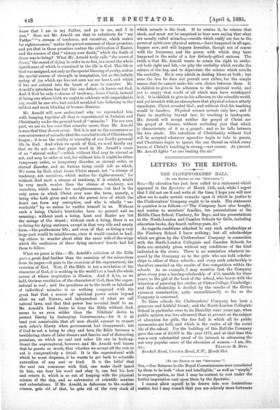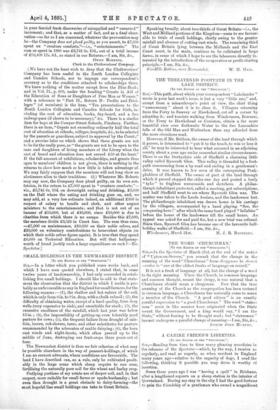[To THE EDITOR OF THE "SPECTATOR "1 Sra,—Our Returns to
the Royal Commissioners were considered by thorn to be both "clear and intelligible," as well as "ample," to supererogation, so that I may be content to rest under the fretful imputation cast upon them by the Spectator.
I cannot allow myself to be drawn into new Contentious matter, but I may remark that you are scarcely more fortunate in your fancied fresh diseoveries of misapplied and " unearned" increment; and that, as a matter of fact, and as a final observation—so far as I am concerned, whatever the provocation may be—the Company does not plead guilty, as you assert, to £7,000 spent on "creature comforts,"—i.e., "entertainments." The sum so spent in 1880 was £3,742 Os. 10d., out of a total income of £50,408 17s. 8d., as stated in our Returns.—I am, Sir, &c.,
OWEN ROBERTS,
Clerk to the Clothworkers' Company.
-[We have not the least wish to deny that the Clothworkers' Company has been useful to the North London Collegiate and Camden Schools, nor to impugn our correspondent's accuracy as to the conditions attached to scholarships there. We know nothing of the matter except from the Blue-Book; and in Vol. IL, p. 809, under the heading " Grants in Aid of the Education of Sons or Daughters of Free Men or Women," with a reference to " Part IL, Return D : Profits and Privileges" (of members) is the item, "Ten presentations to the North London Collegiate and Camden Schools for Girls, including the cost of education, books, day-board, and a free railway-pass (if shown to be necessary)," &a. There is a similar item for boys at the Cowper-Street Schools, Finsbury. Farther, there is an item," Grants not exceeding ordinarily half the total cost of education at schools, colleges, hospitals, &c., to be selected by the parents or guardians, subject to approval by the Court;" and a proviso later on which shows that these grants are not to be for the really poor, as " the grants are not to be open to the sons and daughters of living members of the Livery when the cost of board and education does not exceed £50 at the least." If the full amount of exhibitions, scholarships, and grants thus open to members' children is not given, there is nothing in the returns to show how much or how little is taken advantage of. We may fairly suppose that the members will not long show an abstinence alien to their traditions. (2.) Whatever Mr. Roberts may say now, the Company does plead guilty, on its own confeSsion, in the return to £7,000 spent in " creature comforts,"— viz., £3,742 Os. 10d. on downright eating and drinking, £3,036 on the Hall where the eating and drinking goes on, and, we may add, at a very low estimate indeed, an additional £300 in respect of salary to beadle and clerk, and other august ministers to the entertainments; and that is not out of an income of £50,000, but of £40,000, since £10,000 is due to charities from which there is no escape. Besides this £7,000, the members divide £3,524 in Court fees. The sum thus runs, —27,000 on maintenance, £10,000 on their noble selves, and £20,000 on voluntary contributions to benevolent objects (in which their noble selves figure again). It is true that they spend £6,000 on Technical Education. But will that halfpenny. worth of bread justify such a large expenditure on sack?—ED. Spectator.]



































 Previous page
Previous page